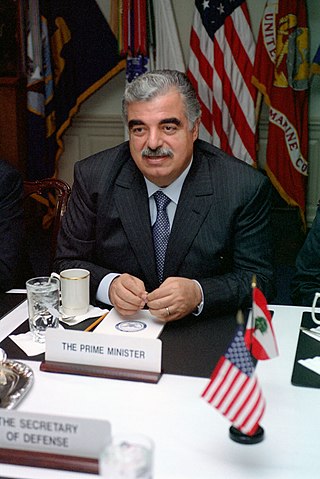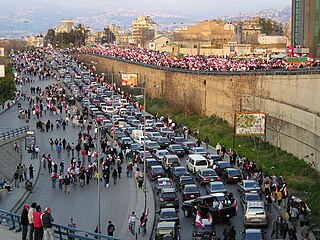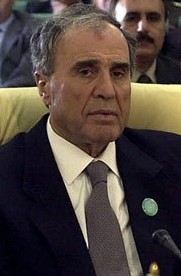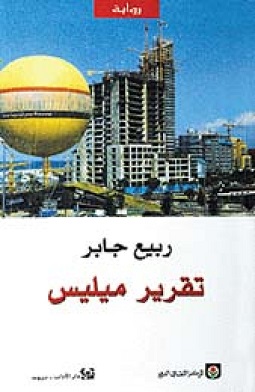
Rafic Bahaa El Deen Al Hariri was a Lebanese business tycoon and politician, who served as the Prime Minister of Lebanon from 1992 to 1998 and again from 2000 until his resignation on 20 October 2004.

The Cedar Revolution or Independence Uprising was a chain of demonstrations in Lebanon triggered by the assassination of former Lebanese Prime Minister, Rafik Hariri. The popular movement was remarkable for its avoidance of violence, peaceful approach, and its total reliance on methods of civil resistance.

Ghazi Kanaan, also known as Abu Yo'roub, was Syria's interior minister from 2004 to 2005, and long-time head of Syria's security apparatus in Lebanon. His violent death during an investigation into the assassination of Rafik Hariri drew international attention.
The Mehlis Report is the result of the United Nations' investigation into the 14 February 2005 assassination of Lebanon's former prime minister Rafik al-Hariri. The investigation was launched in accordance with UN Security Council Resolution 1595 and headed by the German prosecutor, Detlev Mehlis. It involved questioning of Lebanese and Syrian officials.

Abdul Halim Khaddam was a Syrian politician who was Vice President of Syria and "High Commissioner" to Lebanon from 1984 to 2005. He was long known as a loyalist of Hafez Assad until he resigned from his position and left the country in 2005 in protest against certain policies of Hafez's son and successor, Bashar Assad. He accumulated substantial wealth while in office: a Credit Suisse account, opened in 1994, was nearly 90 million Swiss francs in September 2003, per Suisse secrets.
Mustafa Hamdan, is a retired Lebanese army general and head of the presidential guard, and head of Al-Mourabitoun movement.

Serge Brammertz is a Belgian prosecutor, academic and jurist. He serves as the chief prosecutor for the International Residual Mechanism for Criminal Tribunals (IRMCT) since 2016. He also served as the chief prosecutor for the International Criminal Tribunal for the former Yugoslavia (ICTY) from 2008 until its closure in 2017.

The Special Tribunal for Lebanon (STL), also referred to as the Lebanon Tribunal or the Hariri Tribunal, is a tribunal of international character applying Lebanese criminal law to carry out the investigation and prosecution of those responsible for 14 February 2005 assassination of Rafic Hariri, the former Lebanese prime minister, and the deaths of 21 others, as well as those responsible for connected attacks.

United Nations Security Council Resolution 1636, adopted unanimously on 31 October 2005, after recalling resolutions 1373 (2001), 1566 (2004) and 1595 (2005), the council insisted that the Syrian authorities fully co-operate with the inquiry of the United Nations International Independent Investigation Commission (UNIIIC) into the assassination of former Lebanese Prime Minister Rafic Hariri, not least by arresting the suspects identified by the commission in its final report.
The United Nations International Independent Investigation Commission or UNIIIC was established on 7 April 2005 by Security Council Resolution 1595 to investigate the assassination of former Prime Minister of Lebanon, Rafic Hariri, who had been killed in Beirut on 14 February 2005.

On 14 February 2005, former Prime Minister of Lebanon Rafic Hariri was killed along with 21 others in an explosion in Beirut, Lebanon. Explosives equivalent to around 1,000 kilograms of TNT were detonated as his motorcade drove near the St. George Hotel. Among the dead were several of Hariri's bodyguards and former Minister of the Economy, Bassel Fleihan.

United Nations Security Council resolution 1595, adopted unanimously on 7 April 2005, after recalling its support for the sovereignty, territorial integrity and independence of Lebanon, the council established a commission to assist Lebanese authorities in their investigation of the assassination of former Prime Minister Rafic Hariri in Beirut on 14 February 2005.

United Nations Security Council Resolution 1644, adopted unanimously on 15 December 2005, after recalling resolutions 1373 (2005), 1566 (2004), 1595 (2005) and 1636 (2005), the Council demanded that Syria respond to the inquiry of the United Nations International Independent Investigation Commission (UNIIIC) into the assassination of former Lebanese Prime Minister Rafic Hariri, and extended the investigation until 15 June 2006.

United Nations Security Council Resolution 1664 was adopted unanimously on March 29, 2006; after recalling resolutions 1595 (2005), 1636 (2005) and 1644 (2005), the Council requested the Secretary-General Kofi Annan to consult with the Lebanese government concerning the establishment of an international tribunal to try those responsible for the assassination of Prime Minister Rafic Hariri and 22 others in February 2005.

United Nations Security Council Resolution 1686, adopted unanimously on June 15, 2006, after recalling previous resolutions concerning Lebanon and the region, including 1373 (2001), 1566 (2004), 1595 (2005), 1636 (2005), 1644 (2005) and 1664 (2006), the Council extended the mandate of the United Nations International Independent Investigation Commission (UNIIIC) investigating the assassination of former Lebanese Prime Minister Rafik Hariri for one year.

Jamil Al Sayyed is a Lebanese politician, a current Member of the Parliament of Lebanon, and the former head of Lebanon's Sureté Générale or Lebanese General Security Directorate. He was arbitrarily detained for four years, from 2005 to 2009 by a law he drafted himself during the Syrian occupation of Lebanon, due to his alleged involvement in the assassination of former Lebanese prime minister Rafik Hariri. He was released on 29 April 2009 due to "inconsistencies in the statements of key witnesses and of a lack of corroborative evidence to support these statements and to the fact that some witnesses had modified their statements and one key witness had expressly retracted his original statement incriminating the persons detained". On August 18, 2020,The Special Tribunal for Lebanon declared officially in his final judgment on Hariri assassination case that Jamil Sayyed was illegally detained for four years by violation of the international law, and that the United Nations (UN) should compensate him and apologize publicly for his illegal detention, and that the Lebanese authorities should do the same. He was never charged with a crime. He is also a recipient of many International orders and decorations, notably the French Légion d'Honneur, at the grade of “Commandeur”.
Ali Al Hajj is the former major general and director of the Lebanese Internal Security Forces.
Mustafa Badreddine, also known as Mustafa Badr Al Din, Mustafa Amine Badreddine, Mustafa Youssef Badreddine, Sami Issa, and Elias Fouad Saab, was a military leader of Hezbollah and both the cousin and brother-in-law of Imad Mughniyah. He was nicknamed Dhu al-Fiqar referring to the legendary sword of Imam Ali. His death is seen as one of the biggest blows in the Hezbollah leadership.
Wissam Adnan al-Hassan was a brigadier general at the Lebanese Internal Security Forces (ISF) and the head of its intelligence-oriented Information Branch. Seen as a leading Sunni figure in Lebanon, he was also a key player in the opposition March 14 alliance without having a political position.

The Mehlis Report is a book by Lebanese author Rabee Jaber. Published in 2005 in Arabic by Jaber, it tells the story of an architect, Saman Yarid, who is waiting for the United Nations' Mehlis Report to be released in late 2005. The Mehlis Report takes the reader on a journey through Lebanese history regarding the lead up to the release of German prosecutor Detlev Mehlis’ report to the United Nations on October 21, 2005 regarding the February 14, 2005, car bombing assassination of Lebanon’s former Prime Minister Rafik Hariri.











